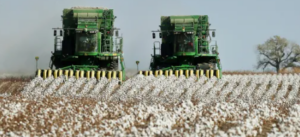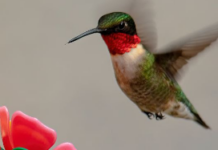A handful of bullish Kansas senators bugged by a proposal intended to prevent beetle infestations that could devastate cotton crops bogged down a boll weevil bill late into the night.
The bill, which passed the Senate early Thursday morning after amending the House version, would create a cotton boll weevil monitoring program.
Proponents posited that such a program will be a public good for protecting the state’s $84 million cotton industry, while opponents argued that it would take away individual rights and hurt farm profitability.
They also argued over semantics, with the contention that a per-bale cost imposed on farmers constitutes a tax and that it is akin to an agricultural commodity checkoff program.
“We need to understand that if boll weevil gets into our cotton, it would devastate not just that field, it would devastate the cotton industry in Kansas,” said Sen. John Doll, R-Garden City.
On the Senate floor, Sen. Mark Steffen, R-Hutchinson, compared creation of a program to communism.
“It’s heavy-handed garbage being shoved down people’s throat,” Steffen said. “This is not going down the path of a democracy and a republic. It’s going down the pathway of communism.”
In a GOP caucus, Steffen suggested the bill would sow distrust among confederate sympathizers. He characterized it as government overreach via a special interest group lobbying for the creation of a new program that takes away individual rights.
“We want boll weevils to remain not present in the state of Kansas, but we want to do it in a democratic fashion, not this heavy-handed approach that’s going to alienate people,” Steffen said. “My area, I’ve got areas that are full of Confederate flags. Why? That has nothing to do with race. It has everything to do with distrust in the government.”
Potential disaster or fearmongering? Boll weevils are a beetle that feeds on cotton buds and flowers. The bugs are notorious for how a plague of the insects can quickly wipe out a crop.
“I find it interesting that after two years of fighting a losing battle in eradicating a virus that we have the audacity to start a new program to eradicate another entity,” said Steffen, who has promoted fringe COVID-19 beliefs. “They haven’t eradicated the boll weevil. It’s been a problem for centuries, and here we are presuming that we have the ability to eradicate Mother Nature once again.”
Decades of expensive eradication efforts in the U.S. have largely been successful. Weevils have been contained to areas of southern Texas near the Mexico border, which is where the beetles originated. Trapping programs have prevented infestations when insects have been discovered farther from the border.
Sen. Michael Fagg, R-El Dorado, said the state’s cotton industry is “being proactive with a pesticide problem that we in Kansas do not understand.”
“Kansas is the only major cotton producing state that does not have a program in statute that meets the U.S. cotton industry’s minimum trapping and spraying standards,” he said.
Boll weevils aren’t in Kansas, nor 16 of the 17 states that have existing programs. Vigilance is necessary, say supporters of creating a program in Kansas, because the insects could find their way here.
The threat is primarily posed by custom harvesters crossing state lines, necessitated by burgeoning production in recent years. The risk remains slim as operators in other states are required to certify their equipment is weevil-free.
“Because boll weevils are hardy, high-producing cotton growing states must remain vigilant in ensuring that outbreaks do not occur,” said Sen. Mary Ware, D-Wichita. “This is a disaster that could happen. This (bill) will keep it from happening.”
“Actually, this bill is a ‘Henny Penny and the sky is falling kind of bill,'” said Sen. Alicia Straub, R-Ellinwood.
Steffen accused his colleagues of “fearmongering.” “I see no reason to think that sowing fear is going to grow cotton,” he said.
House Bill capacity2559 would establish the Kansas cotton boll weevil program. The board of directors would have the power to establish a cotton pest monitoring plan with the authority to enter private property to inspect fields. If pests were discovered, the board could develop an eradication plan.
The program would be funded through an assessment levied on cotton bales, paid by the grower at the time of deposit at the cotton gin.
“This is a tax without representation,” Straub said, noting that the agriculture secretary and Kansas Cotton Association would choose the members while farmers would not have a direct vote.
“Not paying this boll weevil tax could saddle you with a misdemeanor charge,” she said.
Cotton producers have already established a small-scale voluntary trapping program, but industry officials want the state to make participation mandatory.
That voluntary charge is 50 cents per bale. If the bill becomes law, the levy could be as high as $2.
“It seems to me that the voluntary program that cotton growers are currently operating with a 50 cent voluntary fee submitted to the cotton growers association is working just fine,” Straub said. “It seems that we don’t have a boll weevil problem, and why would we welcome one.”
That is not the case, according to past testimony in agriculture committees.
The growth in the state’s cotton industry has surpassed the capacity of the voluntary program, Gary Feist, of the Kansas Cotton Association, testified. The state is unable to meet minimum standards set by the National Cotton Council because of the increasing acreage.
Cotton has become more alluring in the Wheat State amid drought and water issues. The state’s 2020 harvest was worth about $84 million, according to U.S. Department of Agriculture statistics. That year, the 184,000 acres harvested produced about 300,000 bales — up from 50,000 acres in 2010.
Bales weigh 480 pounds. Current cotton prices are $1.30 per pound. A year ago, the price was $0.82.
At the full authorized levy and the current cotton price, a farmer would pay $2 to the prevention program on a bale valued at $624. If the prevention program were in place with the maximum levy during the 2020 harvest, its revenue would have been $600,000.
“The board is going to be sitting there salivating at the money,” said. Sen. Dennis Pyle, R-Hiawatha.
Pyle, who is a farmer, noted that while cotton prices are high, so are agriculture expenses. “You’re taking away from the farmer’s pocketbook with this,” he said.
Steffen tried to make the program refundable, arguing that “from a philosophy standpoint; some farmers won’t want to participate in this. It’s important from a profitability standpoint.”
A failed Straub amendment would have made participation in the program voluntary. Growers could opt out, making them exempt from the provisions of the act while also disallowing them to receive any benefits.
“The most important thing is to have a monitoring program that can monitor all the fields of cotton in Kansas, so I would hate to see some of those fields left out,” said Sen. Marci Francisco, D-Lawrence.
Ware, the Wichita senator, argued that farmers who opt out of the program would still benefit from the program protecting the state’s cotton crop.
“You’re signing up these farmers for an association they’re not a member of, they don’t want to be a member of, for help that they didn’t ask for,” Steffen said.
“We don’t have an emergency situation in regards to boll weevils attacking us from the south,” he said.
A Senate amendment requires inspectors to notify property owners. Previously, the bill would have required only an attempt to notify. That change largely quieted complaints over private property rights.
Straub claimed the bill “would take away their First Amendment freedom of speech and force them under a government checkoff program.”
If out-of-state harvesters are the source of the risk, they should be the ones footing the bill for the mitigation program, Straub argued. She also said herbicide drift has been more destructive to cotton fields.
“It would seem to me that actually the boll weevil is not really the true threat to the cotton crop in Kansas, but drift by 2,4-D or other herbicides, which the cotton plant is fairly vulnerable to, actually has caused more loss of the cotton crop in Kansas,” she said.
Straub said the government should trust farmers to raise their crops.
“It takes as little as 12 days for a boll weevil egg to reach full maturity and emerge from the plant,” said Fagg, the El Dorado senator. “It only takes three days after emergence until the boll weevil has bred and spread at an alarming speed.”
Sen. Dan Kerschen, R-Garden Plain, who is a farmer, chairs the Senate’s agriculture committee. “Our prevention plan, the whole idea is to prevent an outbreak.,” he said. “That’s the goal.”
As reported in the Topeka Capital Journal.





